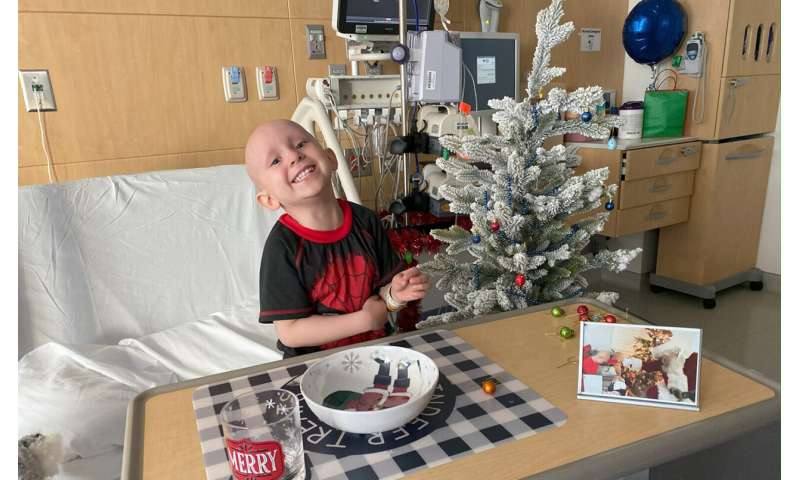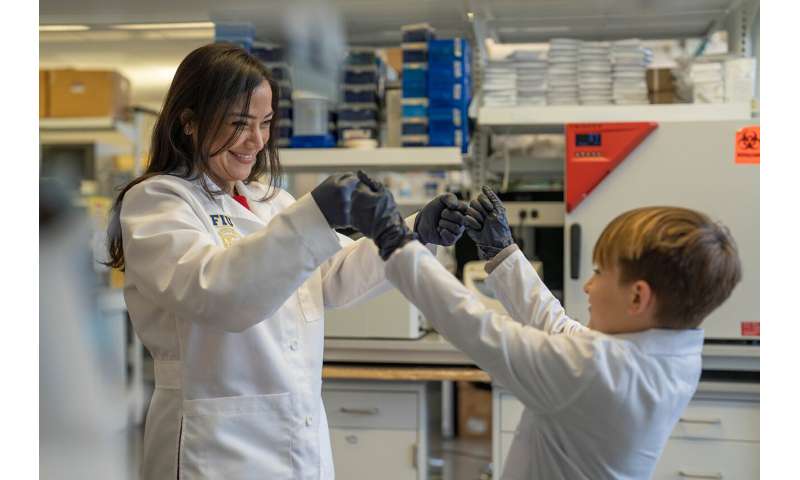The road to remission: A new approach to functional precision medicine for recurrent cancers

For any parent or guardian of a child whose cancer is in remission, the fear of recurrence is ever-present. In 2021, that fear became a reality for the Florida-based Jenner family.
Two years earlier, the Jenners' three-year-old son Logan had been diagnosed with acute myeloid leukemia (AML), an aggressive form of cancer that begins in the bone marrow but can quickly spread to other parts of the body. Three lines of chemotherapy, one bone marrow transplant and 150 days later, Logan went into remission.
In an article published by the Miami Herald, Logan's father Michael Jenner described his son's recovery as a "miracle story." But it didn't remain that way for very long. By the time Logan was five years old, his cancer had returned.
While their son resumed chemotherapy, the Jenners considered their options. It wasn't long before they learned about a clinical trial underway at the Helen & Jacob Shaham Cancer & Blood Disorders Institute at Nicklaus Children's Hospital in Miami. Headed by Florida International University researcher Dr. Diana Azzam, the trial concerned a groundbreaking functional precision medicine approach that targeted cancer by combining genetic testing with artificial intelligence and machine learning-enhanced drug testing.
The Jenners quickly enrolled Logan in the study. Now, two years later, Logan is eight years old. He is healthy and happy. Most importantly, he is cancer-free.
Testing 120 Treatments in One Week
Azzam and her team recently published the results of their first-of-its-kind clinical trial in the April 2024 edition of Nature Medicine. Azzam's approach involves taking blood and/or tumor samples from pediatric cancer patients, then enriching and processing the cancer cells in a lab in a manner designed to closely resemble how the cells would normally grow in the human body.
The cells are then exposed to more than 120 FDA-approved drugs, including both cancer and non-cancer medicines. Additionally, the drugs can be tested in various combinations as recommended by the clinical team. The entire testing process takes about a week.
"Children with rare, relapsed or refractory cancers often face limited treatment options, and few predictive biomarkers are available that can enable personalized treatment recommendations," Azzam's team noted in its published paper. "The implementation of functional precision medicine (FPM), which combines genomic profiling with drug sensitivity testing (DST) of patient-derived tumor cells, has potential to identify treatment options when standard-of-care is exhausted.

The results of the trial? Azzam and her team reported that 83% of children enrolled in the study showed improvement. Further testing with both pediatric and adult patients is currently ongoing; if successful, this new approach could help provide safer, more effective, more affordable, and more readily accessible treatment options to doctors and their patients.
"The Azzam lab approach gets rid of the guesswork and delivers a list of the most effective drugs that the oncologist can work with," Tomás R. Guilarte, one of the paper's co-authors, explained in a Florida International University press release. "It's accelerating our understanding of which cancer treatments work best for patients and their specific needs."
How Logan Jenner Became Cancer-Free
Few pediatric cancer researchers ever meet the participants of their clinical trials; patients typically remain anonymous before, during, and after their participation. In 2022, however, Diana Jenner was attending a pediatric cancer research symposium where Azzam gave a presentation about her work. The pair got to talking and, to their mutual surprise, soon discovered that Diana's son Logan had been enrolled in Azzam's study.
What's more, Azzam's approach changed the course of Logan's treatment for the better, facilitating an improved quality of life without sacrificing therapeutic efficacy.
Data from the trial showed Logan's oncologist, Dr. Maggie Fader (who led the trial alongside Azzam), that her young patient didn't actually need the three-drug regimen he was being prescribed. Consequently, Fader was able to adjust Logan's treatment plan, switching him to a two-drug combination that omitted the use of Idarubicin, a medication known to have negative long-term side effects when taken in high doses.
With Fader's treatment plan guided by Azzam's data, Logan's cancer went back into remission in just 33 days, a marked improvement over the 150-day timeframe of his prior treatment. Today, Logan remains cancer-free. Azzam told the Miami Herald that the eight-year-old is "living proof that this approach works."
"The results are exciting because cancer that comes back is much harder to treat. Seeing improvement in 83% of patients is incredibly promising," Azzam said in the Florida International University press release. "This could be the way we turn cancer into a manageable disease."
Of course, Logan Jenner's recovery is but one piece of a larger story. Researchers all over the world are constantly working towards a brighter tomorrow for pediatric cancer patients. The Pediatric Cancer Research Foundation, for example, has been funding research into hematologic cancers since our founding and are particularly attuned to the limited number of treatment options available to patients who relapse or have disease that becomes resistant to treatment. The Foundation currently supports the work of Dr. Kathleen Sakamoto at Stanford, whose research is studying repurposing the FDA approved drug niclosamide for blocking the growth of pediatric AML cells in children with relapsed or resistant AML.
Anyone interested in learning more about Logan Jenner's treatment and/or Dr. Diana Azzam's research can read the Miami Herald article, the Florida International University press release, or the paper published in Nature Medicine. To stay up to date with all the latest news shaping the future of pediatric cancer treatment, don't forget to follow the Pediatric Cancer Research Foundation Profectus Blog!
Provided by California NanoSystems Institute